Electric Guitar Humidity Overview
Guitar Humidifiers: Electric Guitars
As a guitarist, you understand the importance of taking care of your instrument. You might regularly clean your guitar, change the strings, and even take it for routine maintenance such as a setup. However, one crucial aspect of guitar care that is often overlooked is humidity. Though electric guitars are a bit more forgiving than acoustics when it comes to fluctuations in humidity, they will absolutely be affected by humidity, which can cause severe damage. Humidity can have a significant impact on the playability and longevity of your electric guitar among others. In this article, we’ll explore the effects of humidity on electric guitars and how to maintain optimal humidity levels for your instruments. We’ll also answer the common question, “do you need to humidity an electric guitar?”
What is Humidity, and Why Does it Matter?
Humidity refers to the amount of water vapor present in the air. Relative humidity (%RH) is the measure of the amount of water vapor in the air compared to the maximum amount the air could hold at a given temperature. Check out our complete guide to guitar humidity for an in-depth understanding of the topic, and our acoustic guitar humidity for specific information. The RH in the environment can impact your guitar’s wood and metal components, which can lead to various issues like:
- Warping: When wood absorbs or releases moisture, it can cause the wood to warp or bend, affecting the neck’s straightness or body’s shape. If the humidity levels are too high, the wood can swell, leading to the guitar’s body becoming convex or the neck bowing forward. If the humidity levels are too low, the wood can shrink, leading to a concave body or a neck that bows backward.
- Cracking: As the wood absorbs or releases moisture, it can cause it to crack, leading to the guitar’s structural integrity being compromised. This can affect the sound quality and reduce the instrument’s lifespan.
- Corrosion: Metal components of your guitar, such as the strings, pickups, controls, and frets, can corrode if exposed to high humidity levels for extended periods of time.
- Fret Sprout: When an electric guitar suffers from low humidity, the neck shrinks, causing the edges of the frets to stick out of the guitar.
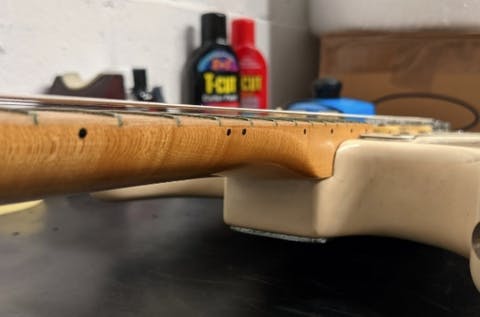
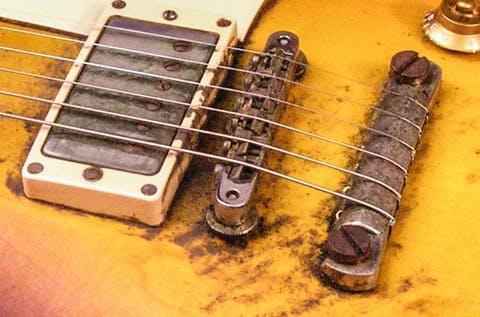
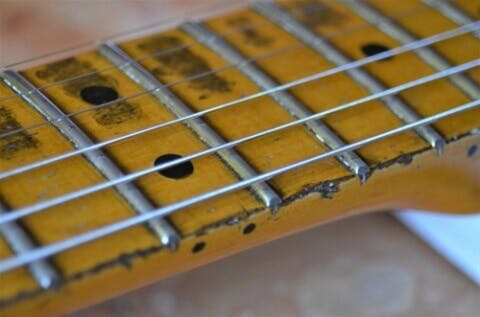
Optimal Humidity Levels for Electric Guitars
Now that you know the adverse effects of humidity on your guitar, it’s essential to know the optimal humidity levels for your electric guitar. Generally, a humidity level of 40-60% is ideal for electric guitars. This range helps maintain the guitar’s structural integrity while ensuring it stays in tune and produces the desired sound quality. The ideal guitar humidity level is 45% RH, which is safe for all stringed instruments including acoustic guitars, electric guitars, mandolins, ukuleles, and others.
Maintaining Optimal Humidity Levels
Here are some ways you can maintain optimal humidity levels for your electric guitar:
- Use a Hygrometer: A hygrometer is a device used to measure the relative humidity levels in the environment. You can purchase a hygrometer at various price points from most guitar shops or online. Place the hygrometer in the guitars’ case or room where you store them, and monitor the levels regularly. Remember, the ideal humidity level is 40%-60%.
- Avoid Extreme Temperature Changes: Rapid temperature changes can cause your guitar to expand and contract rapidly, affecting the wood and metal components. Avoid exposing your guitar to extreme temperature changes, such as leaving it in a car or near a heater or air conditioner.
- Regularly Maintain Your Guitar: Regularly maintaining your guitar, such as cleaning and oiling the fretboard, can help prevent the wood from absorbing too much moisture. It’s also essential to change the strings regularly, as old strings can rust and corrode if exposed to high humidity levels. We suggest investing in an annual setup from your trusted luthier to keep your instruments at peak playability and avoid possible damage.
- Store Your Guitar in a Humidity-Controlled Environment: Investing in a humidity-controlled guitar display case, guitar humidor, or utilizing a room humidifier will aid in preserving your instruments by maintaining the ideal humidity level. Humidification cabinets and other devices regulate the humidity levels by releasing or absorbing moisture as needed depending on the model. See our in-depth guide on the best humidifiers for guitars to help choose the best setup for your room.
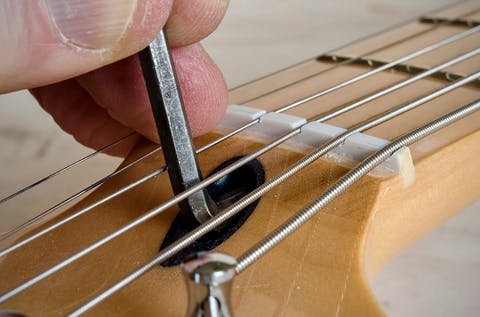
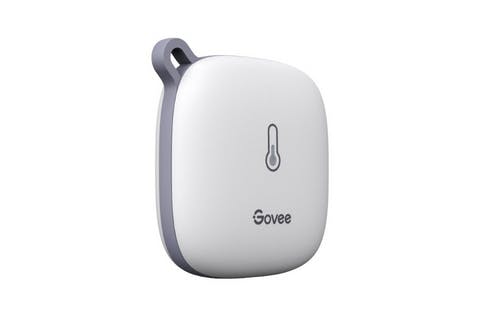
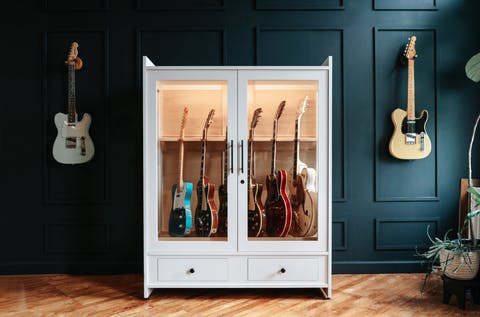
Conclusion
Maintaining optimal humidity levels for your electric guitar is crucial for its longevity and playability. By understanding the effects of humidity on your guitar and implementing the above tips, you can keep your instrument in top condition and produce the desired sound quality. Maintaining the correct humidity level in your music room, storage, cases or cabinets is of the utmost importance to avoid issues such as neck warp, fret wear, and a recurring need for multiple setups. Though electric guitars can be more forgiving when it comes to fluctuations in humidity levels, extended exposure to undesirable conditions will cause damage over time, particularly for electric instruments with set necks. Therefore, you absolutely should maintain the humidity level wherever you store your electric guitars.
American Music Furniture
At AMF, we provide the best guitar humidification tools in our Guitar Habitats. For the past decade, these guitar humidors have provided collectors with handcrafted display cases and cabinets to preserve, display, and provide access to some of the most desirable and well-known instruments around the world. In addition to humidification and storage solutions, we also offer small accessories including our handmade guitar wall hanger, multi-guitar stand display, and others. Contact us today for any questions about our products including vinyl record storage, custom built-ins, and others! (267) 272-2460 | info@americanmusicfurniture.com